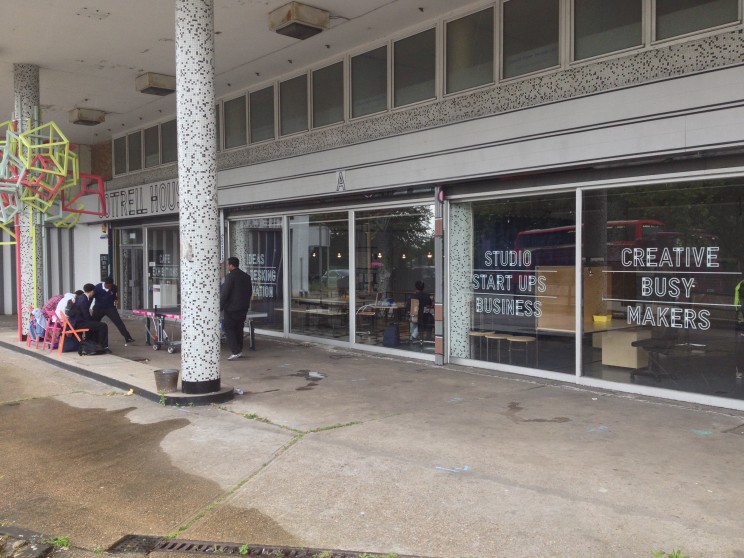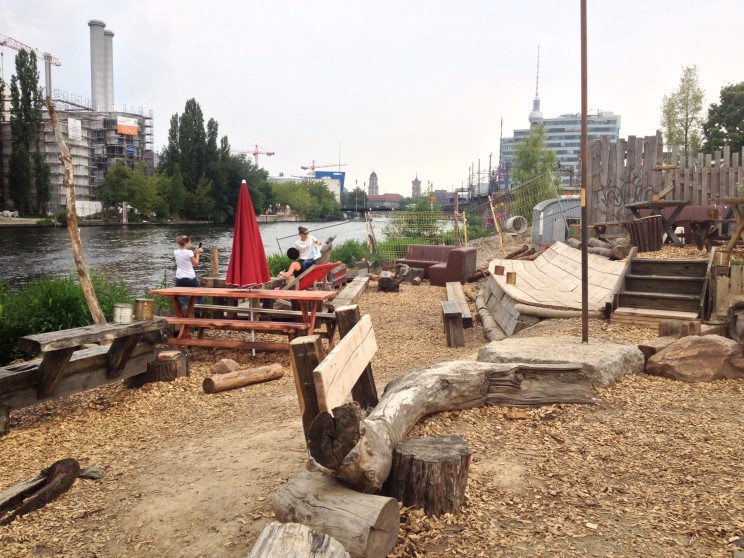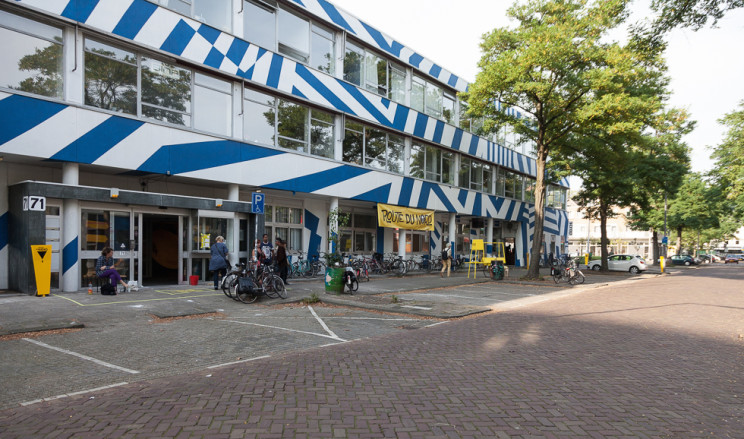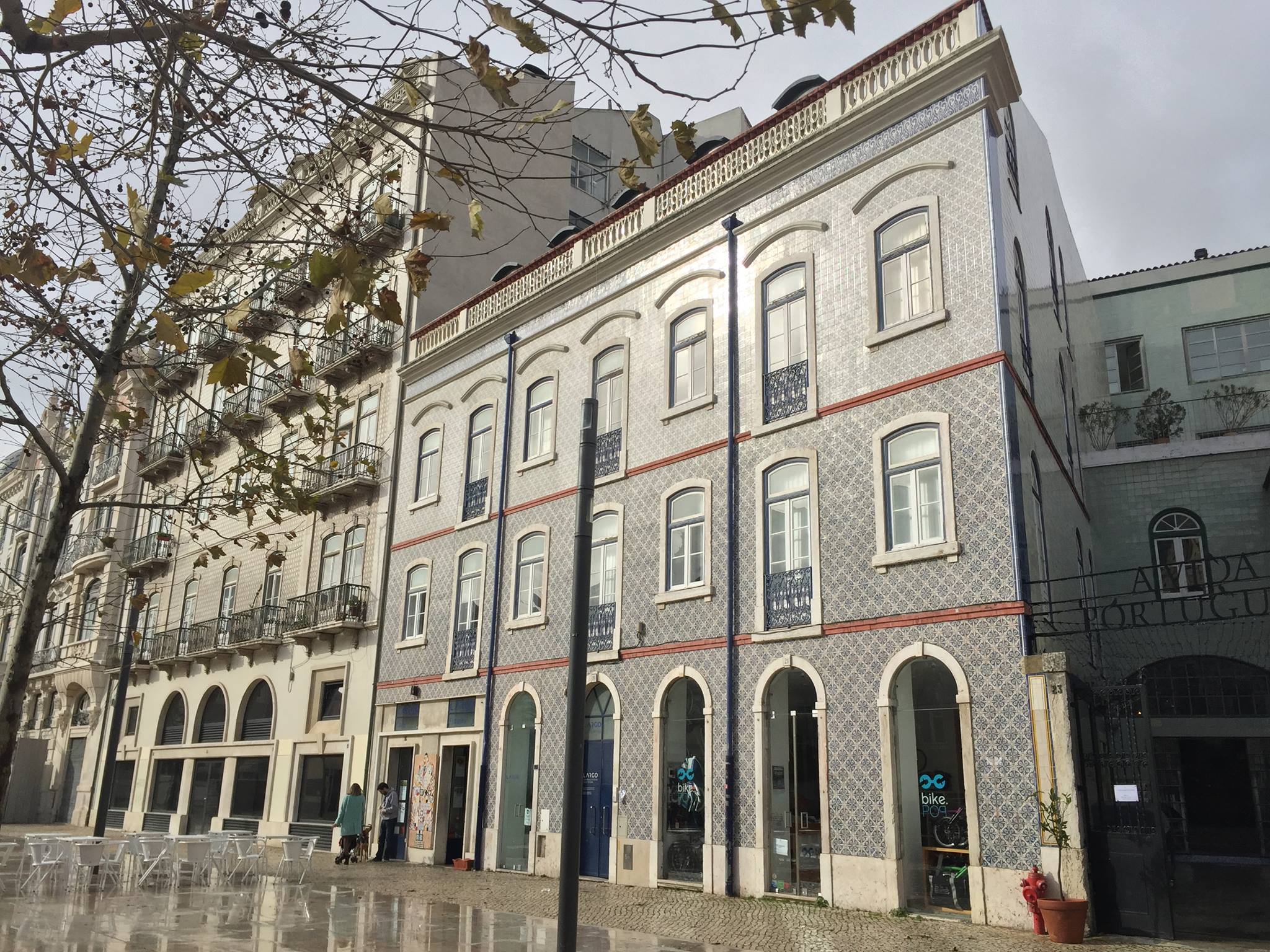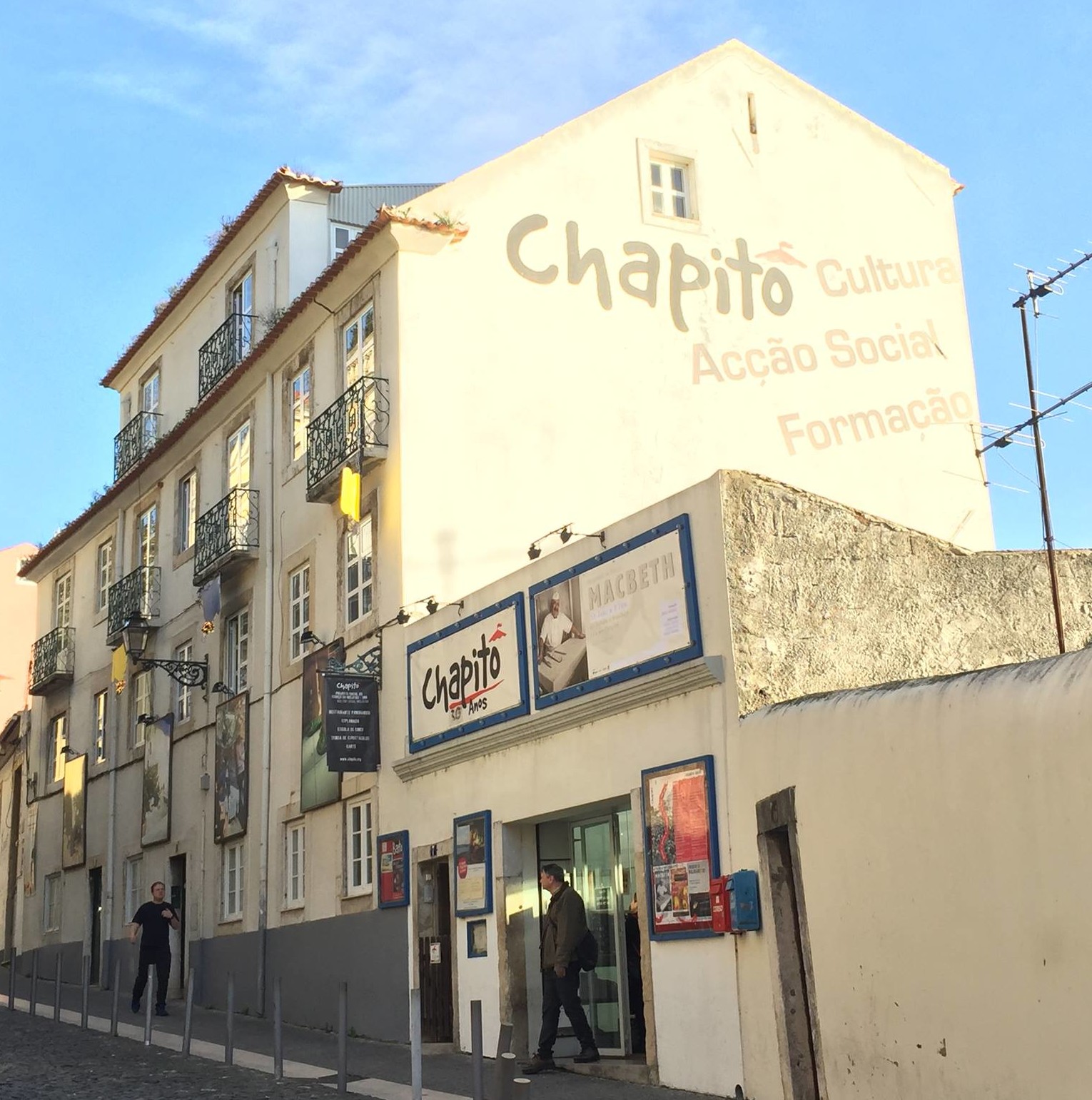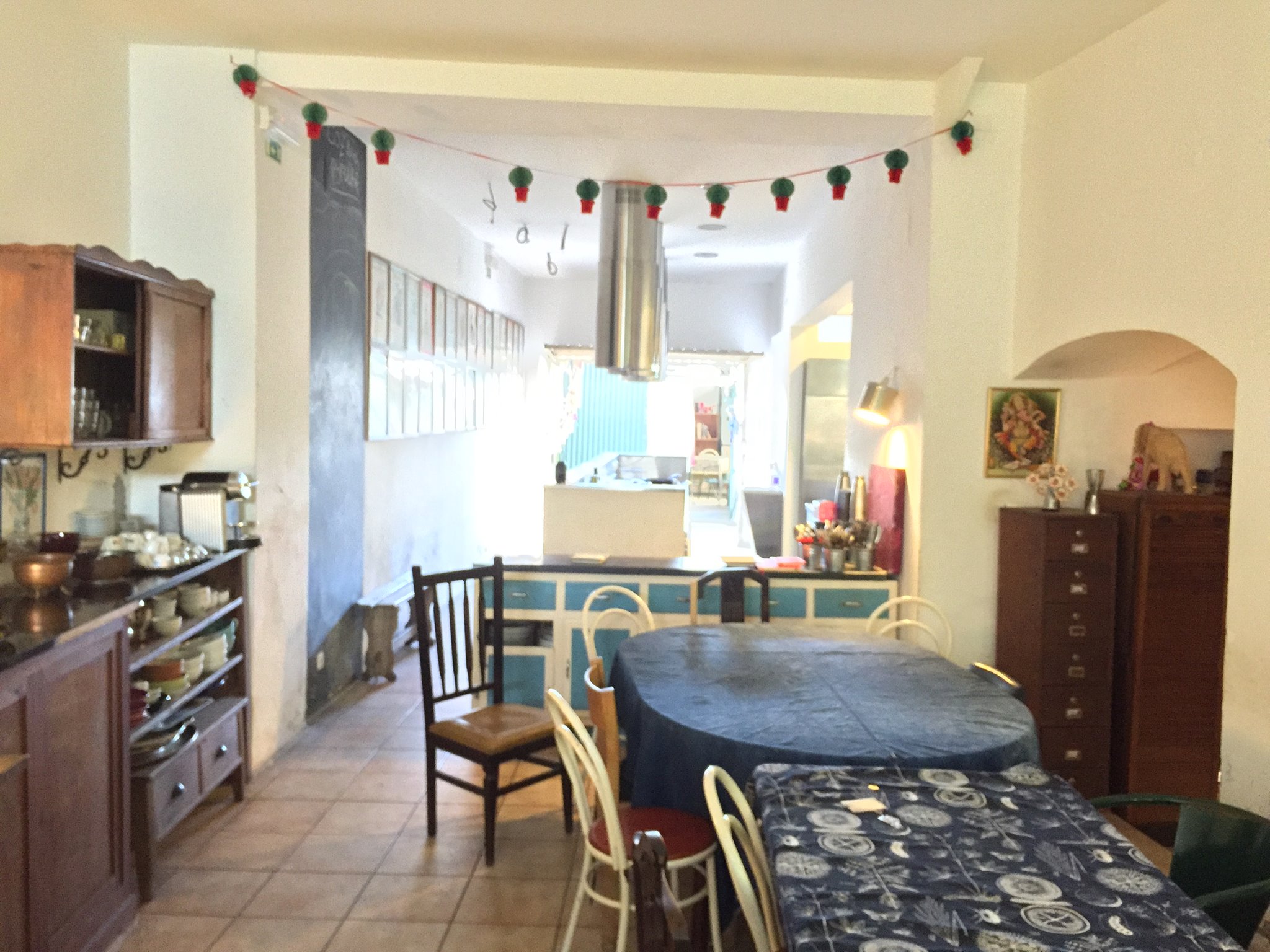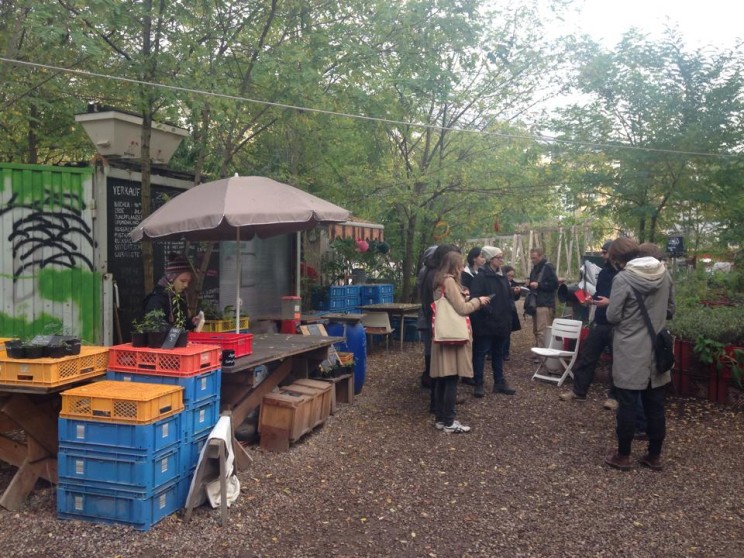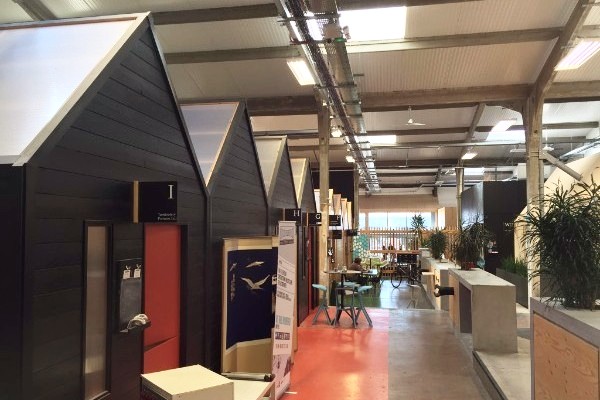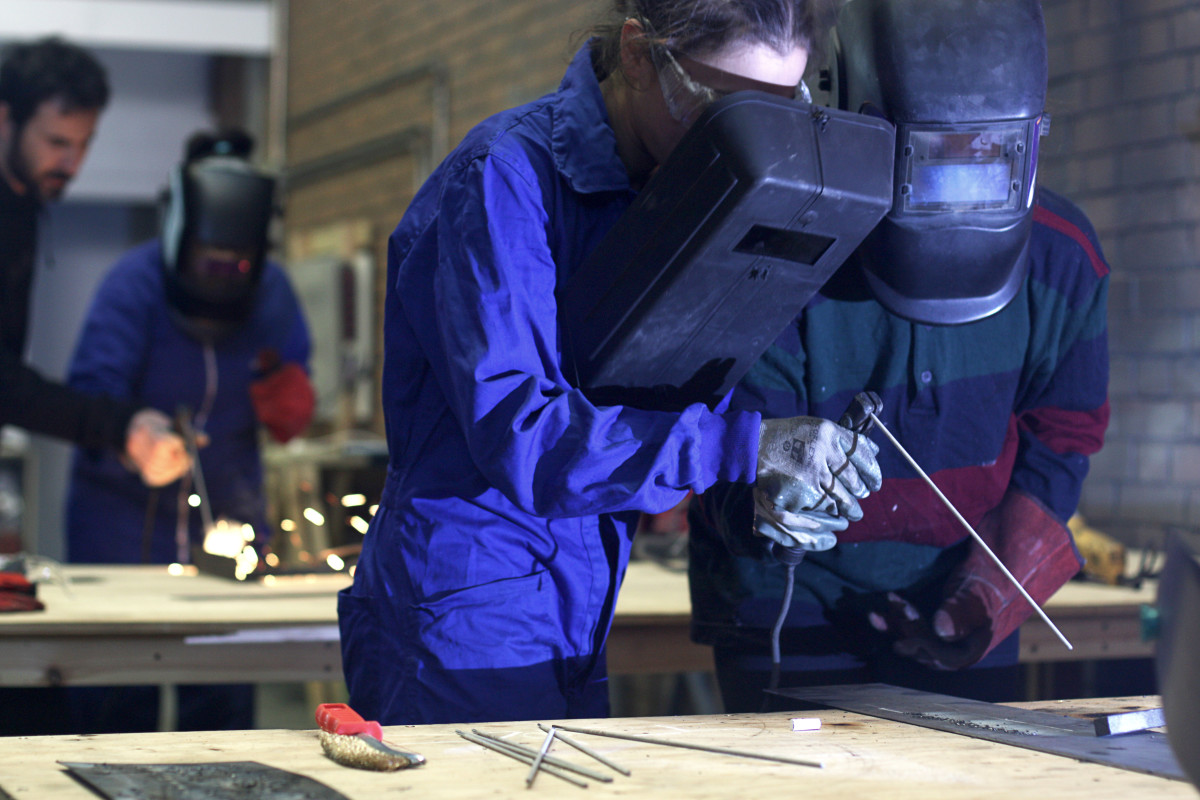Learn more about Funding the Cooperative City
EXROTAPRINT IN BERLIN, GERMANY
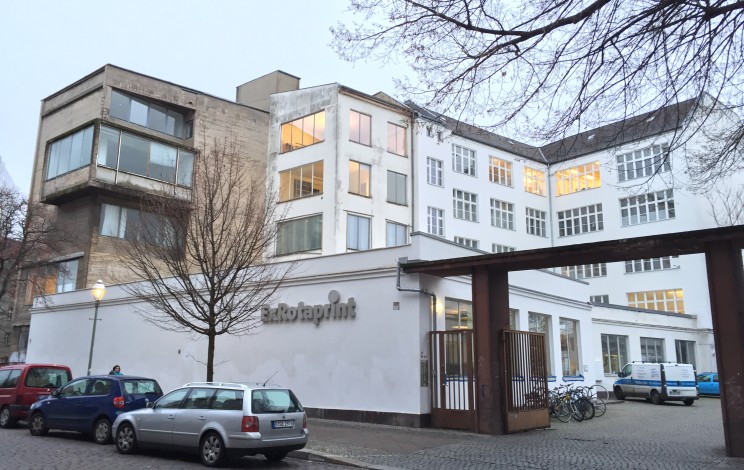
The non-profit GmbH ExRotaprint disrupts the speculation-spiral of the real estate market and owns the buildings through a heritable building right. It is responsible for all aspects of project development, the financing, renting of spaces, and renovating the ExRotaprint site. ExRotaprint gGmbH partners do not profit from the income generated by the property and cannot realize any increase in value from a sale of their stake in the partnership.Thus a long-term and stable location is created that can be developed on its own terms.
HOMEBAKED IN LIVERPOOL, UK
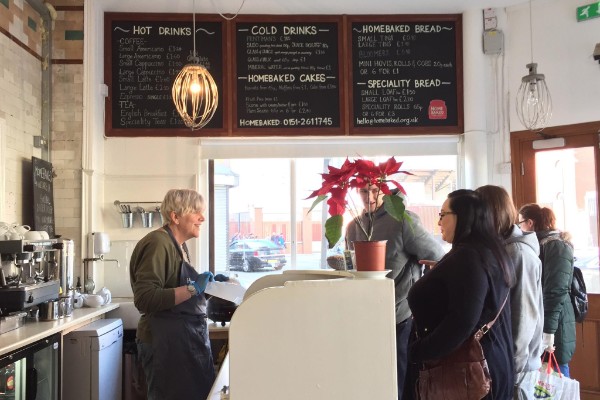 Homebaked is a cooperative bakery in Anfield, close to the famous stadium, that was setup to create al alternative to the clearance of the houses, following the Housing Market Renewal Initiative. The bakery is the result of an intervention of the Liverpool Biennial that gained great international visibility thanks to the commitment to the project by Jeanne Van Heeswijk. Today the bakery is a community land trust aiming at the regeneration of the bakery as well as the surrounding housing.
Homebaked is a cooperative bakery in Anfield, close to the famous stadium, that was setup to create al alternative to the clearance of the houses, following the Housing Market Renewal Initiative. The bakery is the result of an intervention of the Liverpool Biennial that gained great international visibility thanks to the commitment to the project by Jeanne Van Heeswijk. Today the bakery is a community land trust aiming at the regeneration of the bakery as well as the surrounding housing.
CAMPO DE LA CEBADA IN MADRID, SPAIN
After the construction of a market hall and a sports centre in the La Latina neighbourhood was interrupted by the economic crisis, Campo de la Cebada was abandoned until a festival installation and then later a community group claimed its right to use it. As a result of the reunions and assemblies gathering an increasing number of people, the community formed an association and gave a formal proposal to the municipality. Accepting the proposal, the municipality signed a temporary cession with the association that began managing the space in 2011, running it as a sports field, a meeting point and an event venue for concerts and film screenings.
DE CEUVEL IN AMSTERDAM, NETHERLANDS
De Ceuvel is a planned workplace for creative and social enterprises adjacent to the van Hasselt kanaal off the river IJ in Amsterdam North. The land was secured for a 10 year lease from the city of Amsterdam after a group of initiators won a tender to turn the site into a regenerative urban oasis. The former industrial plot will be turned into a site for the most unique and sustainable urban developments in Europe. The site, which is now heavily polluted, will feature imaginatively retrofitted house- boats placed around a winding bamboo walkway and surrounded by an undulating landscape of soil-cleaning plants. Each of the upgraded boats will house offices, ateliers, or workshops for creative and social enterprises, and the plan also includes a public teahouse and bed & breakfast.
6B IN PARIS, FRANCE 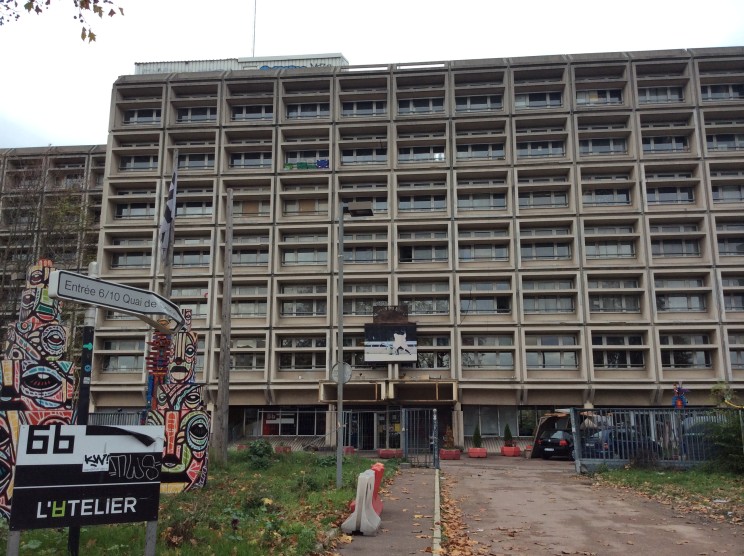
Located in Saint-Denis, a northern suburb of Paris, the former Alstrom building that accommodates 6B is part of a large-scale urban development project. Beginning in 2009 to gradually fill the empty building of 7000 m2, in five years 6B has become a major cultural venue in the Parisian agglomeration: renting 160 units to individuals, associations and enterprises adding up to about 300 people, with different activities and incomes. Gradually turned into an asset in the developer’s eye, and acting as a site of cultural exchange and social cohesion, 6B’s building is no longer on the demolition list: it has been integrated in the area’s development plans and the association managing the centre is now looking for ways to buy the complex.
MÜSZI IN BUDAPEST, HUNGARY
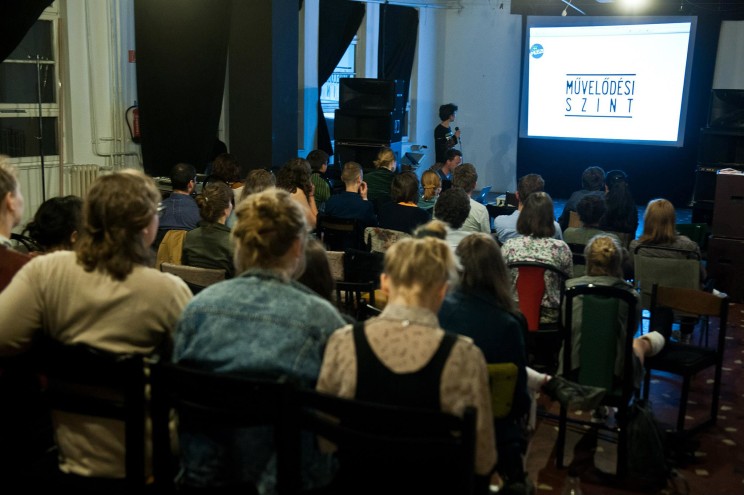 Müszi is a cultural centre operating on the 3rd floor of a department store. Müszi also accommodates artists, NGOs and start-up companies, standing as an unprecedented venture in Budapest, a venue attempting to combine its artistic and social mission with business principles in a sustainable manner.
Müszi is a cultural centre operating on the 3rd floor of a department store. Müszi also accommodates artists, NGOs and start-up companies, standing as an unprecedented venture in Budapest, a venue attempting to combine its artistic and social mission with business principles in a sustainable manner.
MEANWHILESPACE IN LONDON, UK
Meanwhile Space is a Community Interest Company founded in 2009. The CIC began as the delivery arm of the Department for Communities and Local Government-funded Meanwhile Project which aimed to boost community uses of empty properties and sites. The project has built a ‘library’ of ideas and information as a resource to make it easier for both the landlord and the project sides to realise Meanwhile opportunities, including the Meanwhile Manual, Lease and Insurance policies. As a result of the project, several British municipalities like Glasgow or London published standardised temporary use contract samples facilitating the agreement between owners and users, by defining terms of purpose, duration, rent and liabilities.
HOLZMARKT IN BERLIN, GERMANY
The Holzmarkt cooperative was founded with the goal to revitalize the last vacant land left on the river Spree with cultural, leisure and ultimately economically viable activities. It provides citizens and investors the opportunity to participate with one vote, whilst securing the artistic freedom of the project at the same time. In the Genossenschaft für Urbane Kreativität (GuK – Cooperative for urban creativity), entrepreneurs, creators and supporters have joined together to facilitate the sustainable development of the urban quarter “Holzmarkt”. The GuK does not only invest money, but also supports the economic project planning and development of sustainable funding models.
ZOHO IN ROTTERDAM, NETHERLANDS
Photo Zoho © NewEurope
In the Central-Rotterdam area of „Zoho” (the Summer Hofkwartier) the collaboration between Stipo and the Havensteder housing association has brought forward the redevelopment of the degraded area. Through negotiations with property owners and attracting members of the creative sector as well as local entrepreneurs and residents, it was possible to approach the neighbourhood as a whole with connecting spatial, social, economic, and cultural components.
CARLTHORPE PROJECT IN LONDON, UK
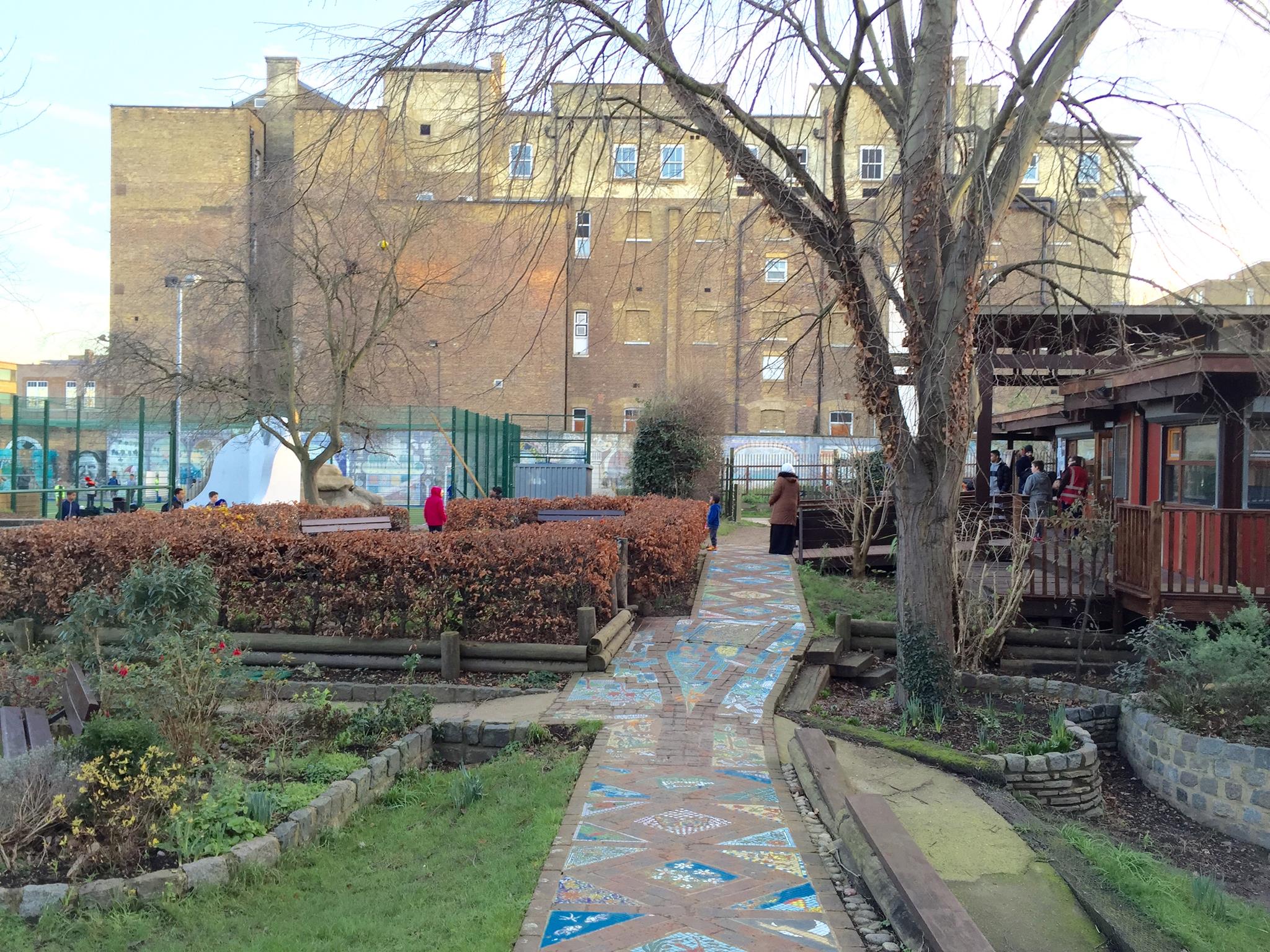 Just a few blocks away from St Pancras in London, after the failure of a large office development project, local residents began campaigning for a park and sent delegations to Camden Council. The communities efforts were rewarded and in June 1983 Camden allocated money to develop the site for gardens, play space and under fives activities for the residents of Kings Cross. In 1984 the The Calthorpe Project became a charity and a company limited by guarantee.
Just a few blocks away from St Pancras in London, after the failure of a large office development project, local residents began campaigning for a park and sent delegations to Camden Council. The communities efforts were rewarded and in June 1983 Camden allocated money to develop the site for gardens, play space and under fives activities for the residents of Kings Cross. In 1984 the The Calthorpe Project became a charity and a company limited by guarantee.
LARGO RESIDENCIAS IN LISBON, PORTUGAL
Largo Residências is a cooperative hostel, artist-in-residency and café in Lisbon’s Intendente neighborhood. Besides producing a variety of cultural initiatives that address the area’s diverse population, Largo also employs local residents, thus playing an important integrative role in the city.
Chapitô, in Lisbon’s Castelo neighborhood was founded in 1974 by a group of performers, artists, architects, philosophers, in order to create a place where troubled youth can be empowered through art and circus. 40 years into its existence, Chapitô is a well-established school and community space including an autonomy house, a theater, production studios, rehearsal tents, a library, a bar and a restaurant, and is now in the process of developing its new building.
COZINHA POPULAR NA MOURARIA IN LISBON, PORTUGAL
Social Kitchen in Lisbon’s Mouraria neighborhood, offering employment, affordable food and community space for local residents. The Cozinha Popular da Mouraria was kickstarted by the municipality’s BIP/ZIP initiative.
ZK/U – ZENTRUM FÜR KUNST UND URBANISTIK, BERLIN (DE)
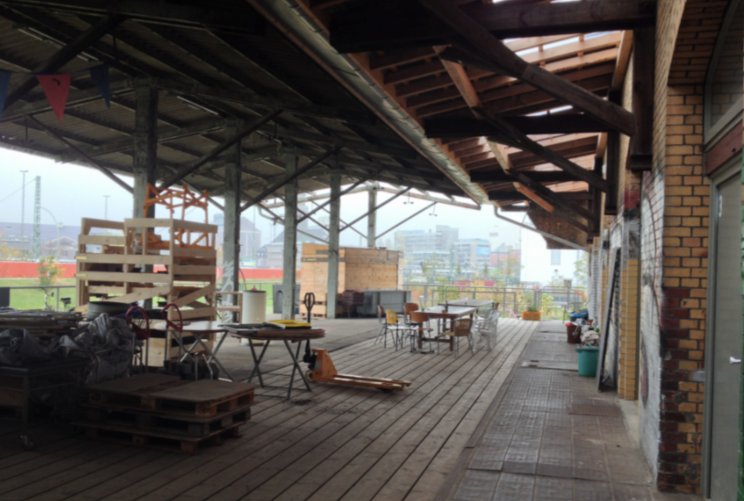
The ZK/U concept and practice were initiated by the artist collective and non-profit organization KUNSTrePUBLIK e.V.. The association managed to become the owner of the former railway depot and holds a 40 year lease on the ground. KUNSTrePUBLIK‘s concepts and projects are equally focused on local involvement and international exchange. The space offers the possibility to explore ways of collaborating, researching and creating new ways of developing the city.
Nomadisch Grün (Nomadic Green) launched Prinzessinnengärten (Princess gardens) as a pilot project in the summer of 2009 at Moritzplatz in Kreuzberg, a site which had been a wasteland for over half a century. Along with friends, activists and neighbours, the group cleared away rubbish, built transportable organic vegetable plots and reaped the first fruits of their labour. The project currently has a temporary permission and has become a place of discovery where children, neighbours, experts and those curious about sustainable living can come together to about and explore alternative visions for the city.
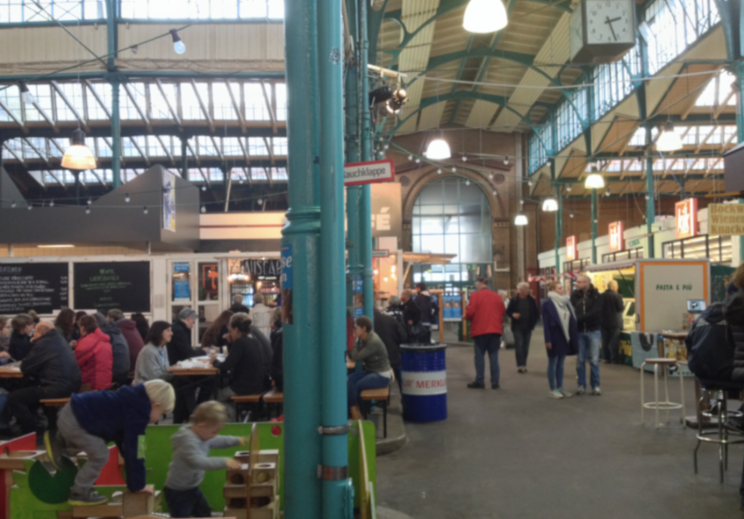
The Markethalle Neun aims at demonstrating how “different food” and “other shopping” in the city are possible. Between 2009 and 2011, many local inhabitants protested against the market being privatised and contributed to the City of Berlin rethinking their policy for selling public property. In 2012 the market was sold for the bid with the best program, that foresaw the development of a multi-functional market hall. Through the reintroduction of small-scale food vendors and artisans it was possible to re-appropriation the old market hall as a lively place in the neighborhood. Further information: markthalleneun.de
BALTIC TRIANGLE, LIVERPOOL (UK)
Liverpool underwent great generation projects over the last years, like the famous Albert Docks that became the emblem of the transformation from an industrial city to a creative one. Not far from the Docks is the Baltic Triangle, an uprising area that is becoming the Creative Cluster of the city. Some of the abandoned warehouses were bought and renovated by the city council and were then taken over by a Community Interest Company run by representatives of the private creative enterprises, that reinvests the profit for the further regeneration of the area.
GRANBY FOUR STREETS CLT, LIVERPOOL (UK)
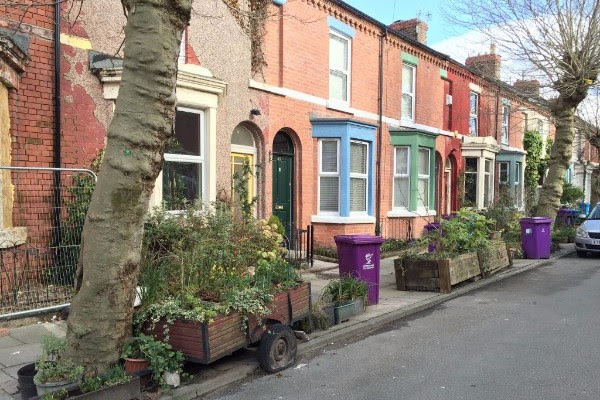 The project recently gained much visibility thanks to the award of the prestigious Turner Prize in 2015, for the first time given to a community project. The Granby Four Streets is a Community Land Trust founded in 2011 to create an alternative to the possible clearance of the neighbourhood, following the Housing Market Renewal Initiative. Today they are renovating 10 houses on Cairns St – five for shared equity sale and five for affordable rent. They do this alongside other housing providers and developers, who will be bringing the remaining properties in the Four Streets neighbourhood back into use.
The project recently gained much visibility thanks to the award of the prestigious Turner Prize in 2015, for the first time given to a community project. The Granby Four Streets is a Community Land Trust founded in 2011 to create an alternative to the possible clearance of the neighbourhood, following the Housing Market Renewal Initiative. Today they are renovating 10 houses on Cairns St – five for shared equity sale and five for affordable rent. They do this alongside other housing providers and developers, who will be bringing the remaining properties in the Four Streets neighbourhood back into use.
SELF-HARVESTING (Selbsternte) – Vienna, AT
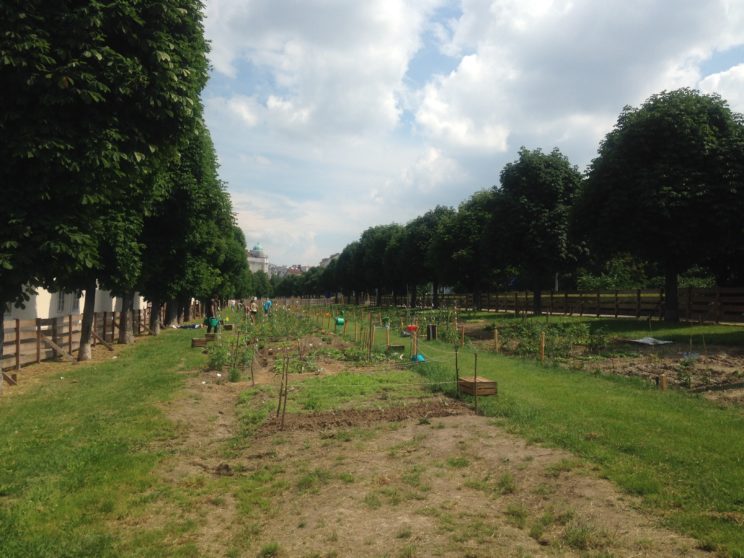
The Self-Harvesting process was invested in Vienna by the Selbsternte initiative where organic farmers prepare a plot of arable land and plant rows of various species. The land is sub-divided in strips that are rented out to the self-harvesters to grow their food. Today there are 7 plots in the city, some also developed in collaboration with the City Council.
CVERNOVKA Cultural Centre – Bratislava, SK

The Cvernovka since ten years has been inhabited by various companies and organisations that have turned it from a derelict industrial building into a buzzing creative cluster. Today, after having changed ownership numerous times since privatisation, the temporary lease contract will not be renewed even though the creative community even founded a Foundation to try to buy the building. The alternative solution though has been to move to an abandoned school where to start newly the experience with a long time contract with the Administration, who recognised the value of having such a reality in the city.
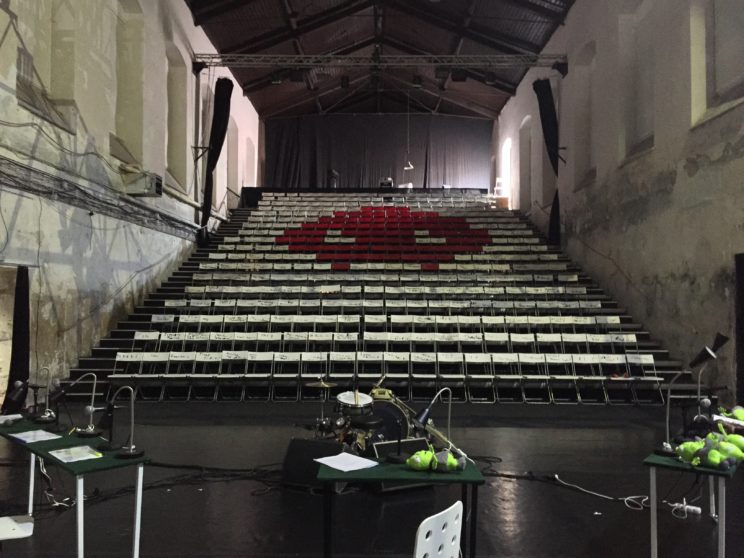
Jatka78 is a multifunctional theatre, music club, gallery, training halls, rehearsal room and gym. Founded by a new circus company, the former industrial halls located inside Prague’s Holesovice market were first used as a storage space and then were converted to a theatre.
OLD MARKET HALL (Stará tržnica) – Bratislava, SK
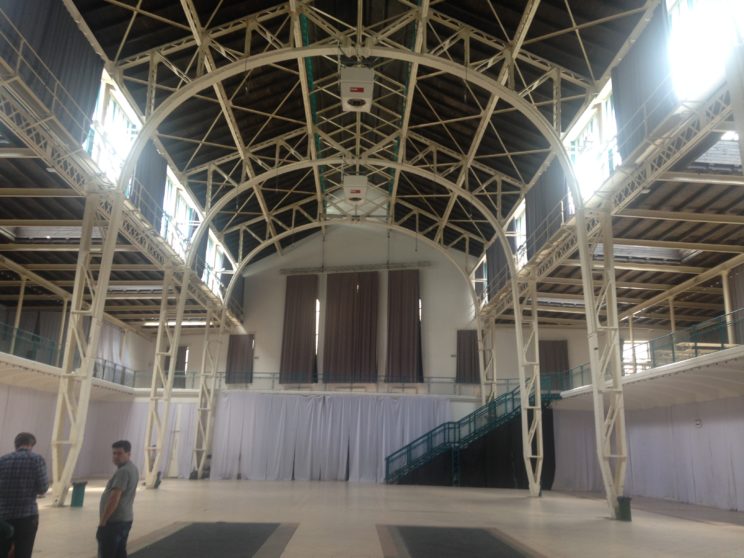
The Old Market Hall (Stará tržnica) in Bratislava is a historical building dating from 1910. It currently serves as a meeting point, offering food markets every Saturday and cultural events on other days. Situated in the building are two cafés, a grocery shop, a cooking school and a soda water manufacture.
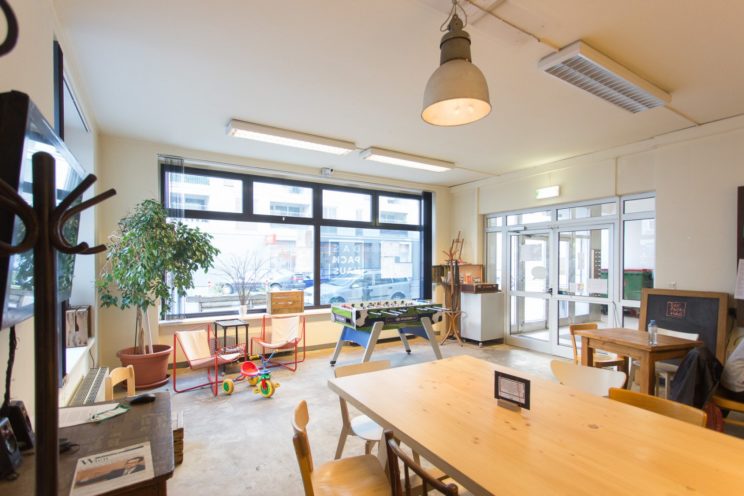
In April 2014 in Vienna, a former vacant office building from the 1970s reopened to the public, offering spaces for users, projects, initiatives and small organizations on its 2200m2 surface spread over 7 floors. Das Packhaus hosts 200 people from various backgrounds that benefit by professional cooperations in the office building used on a temporary use lease.
Afrikaanderwijk Cooperative, Rotterdam (NL)
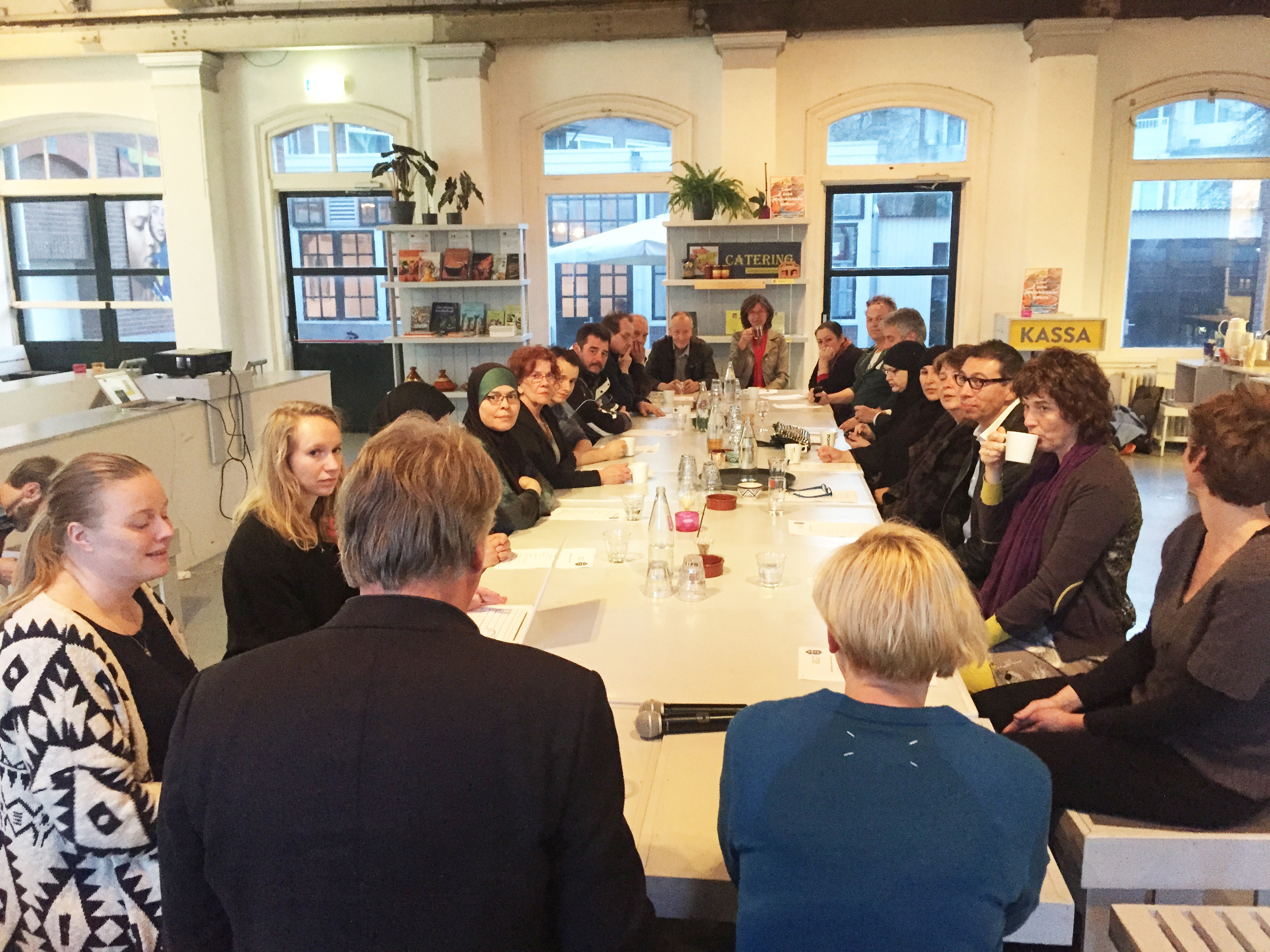 The Afrikaanderwijk Cooperative sees the advantages of the diversity of cultures, inhabitants, and shopkeepers, contributing to the neighbourhood with their own talents, knowledge, and skills. It operates in a multicultural and international area in Rotterdam. In 2013 the Afrikaanderwijk Cooperative was founded as a custom-made organisational form: a cooperative on the scale of a neighbourhood. The cooperative is an umbrella organisation that connects workspaces with shopkeepers, local makers, social foundations, and the local food market. The Cooperative recognises the power of local communities and small organisations in which learning and work are intertwined.
The Afrikaanderwijk Cooperative sees the advantages of the diversity of cultures, inhabitants, and shopkeepers, contributing to the neighbourhood with their own talents, knowledge, and skills. It operates in a multicultural and international area in Rotterdam. In 2013 the Afrikaanderwijk Cooperative was founded as a custom-made organisational form: a cooperative on the scale of a neighbourhood. The cooperative is an umbrella organisation that connects workspaces with shopkeepers, local makers, social foundations, and the local food market. The Cooperative recognises the power of local communities and small organisations in which learning and work are intertwined.
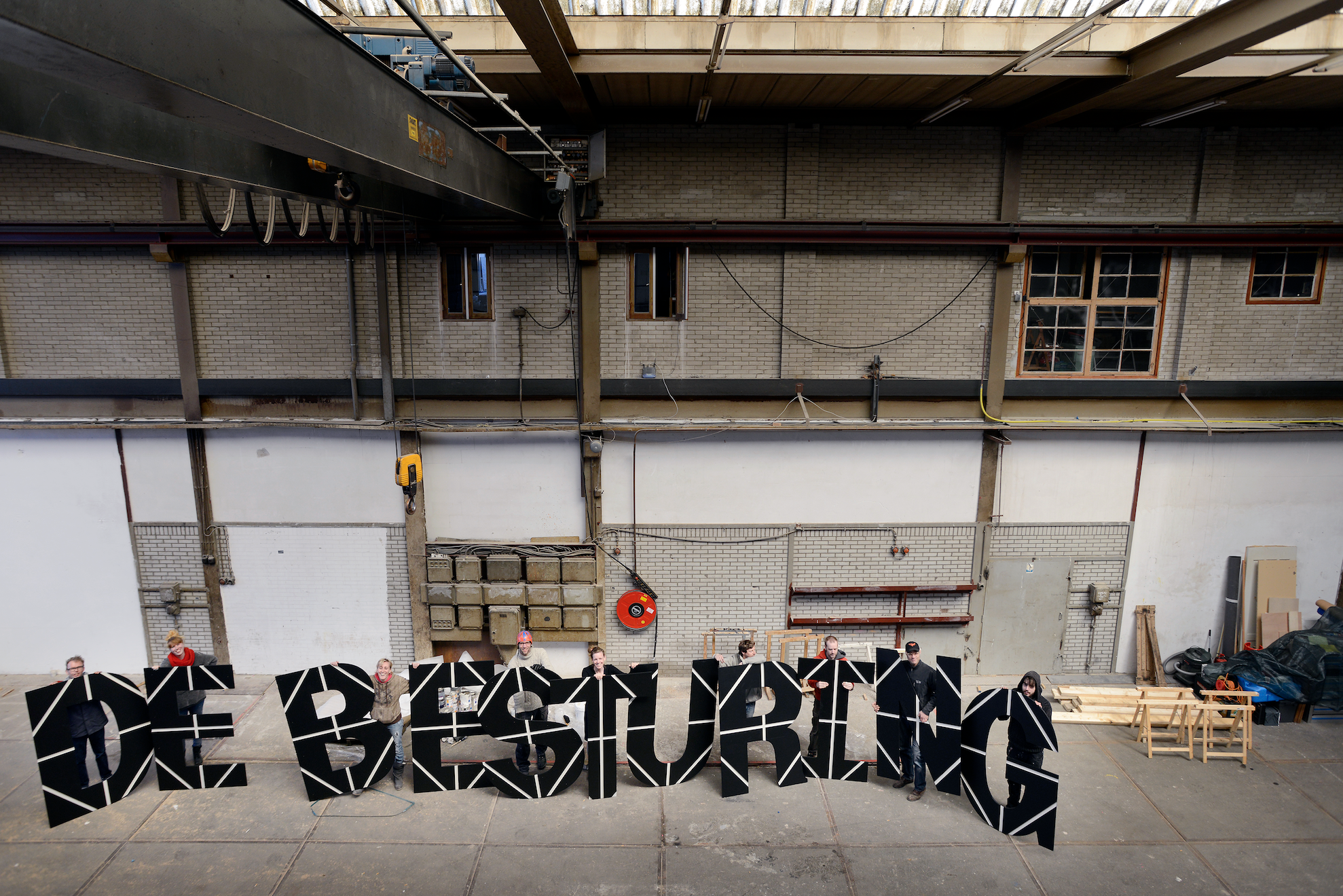 The creative hub De Besturing has started during the re-development of an industrial area in the Hague. When this process stopped, the DB community started to push their presence further in the area, taking over the vacant spaces and having as a long term vision to build a place for innovative thinking in arts, design and technology. Within DB, independent entrepreneurs develop projects under the umbrella of a cooperative and profits of the cooperation are redistributed to kick-start new initiatives. DB operates as an opinionated community by having a role in the public debate around culture and innovation in their city.
The creative hub De Besturing has started during the re-development of an industrial area in the Hague. When this process stopped, the DB community started to push their presence further in the area, taking over the vacant spaces and having as a long term vision to build a place for innovative thinking in arts, design and technology. Within DB, independent entrepreneurs develop projects under the umbrella of a cooperative and profits of the cooperation are redistributed to kick-start new initiatives. DB operates as an opinionated community by having a role in the public debate around culture and innovation in their city.
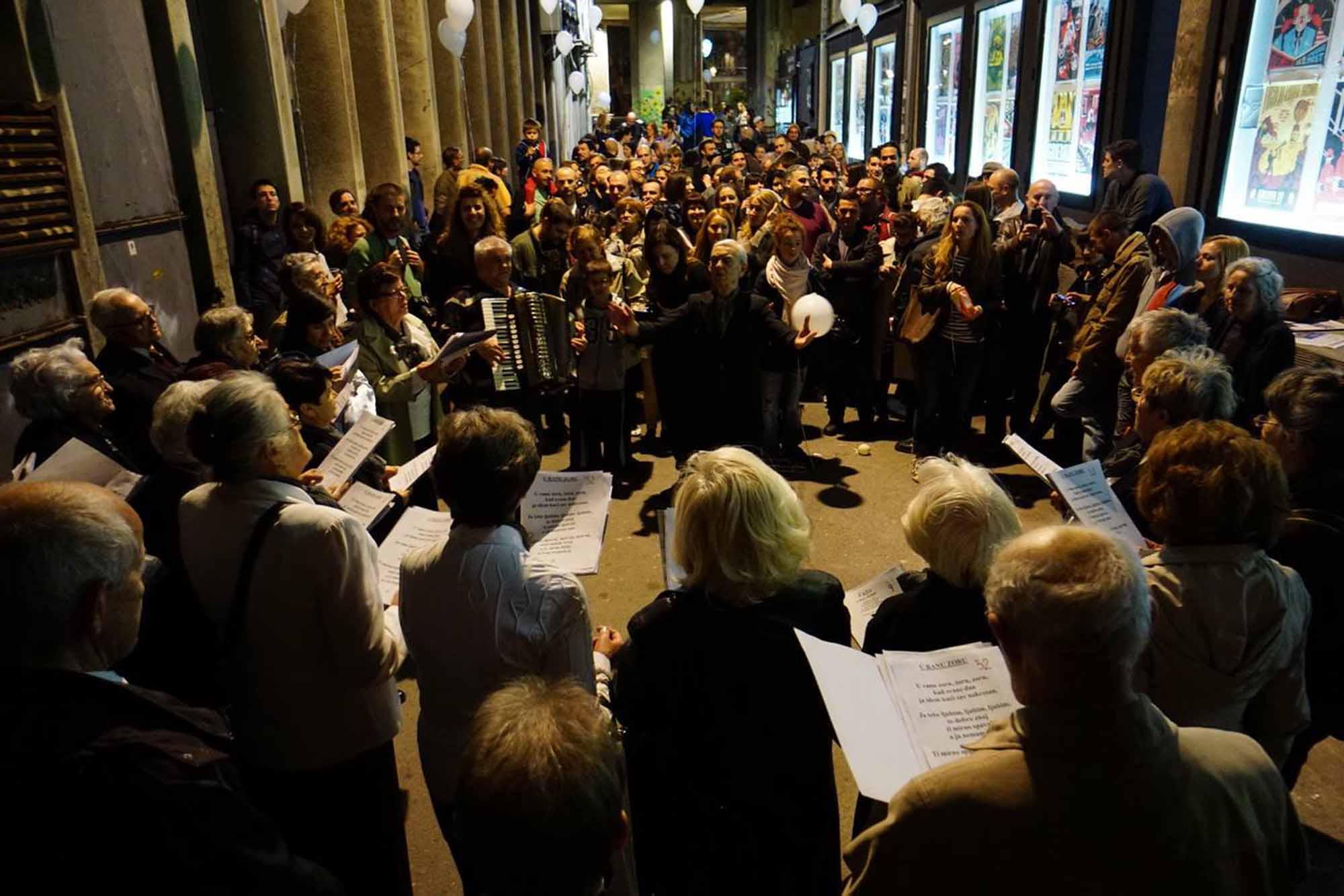 The Street Gallery is located in the centre of Belgrade, using the walls of a private cinema. Its objective is to reconstruct and revitalise neglected public spaces for cultural and artistic purposes. The gallery hosts exhibition openings every two weeks, and regularly accommodates workshops on various themes. The project was initiated by members of the Belgrade collective Ministry of Space, who, together with the local community, refurbished the space and provided public furniture. The Street Gallery is a pioneering case of a community managing public space in Serbia that led, through negotiations with the local municipality, to a legal framework which defines in which way administrations can let public properties to local civic organisations. The Street Gallery project has inspired projects in seven other cities across Serbia.
The Street Gallery is located in the centre of Belgrade, using the walls of a private cinema. Its objective is to reconstruct and revitalise neglected public spaces for cultural and artistic purposes. The gallery hosts exhibition openings every two weeks, and regularly accommodates workshops on various themes. The project was initiated by members of the Belgrade collective Ministry of Space, who, together with the local community, refurbished the space and provided public furniture. The Street Gallery is a pioneering case of a community managing public space in Serbia that led, through negotiations with the local municipality, to a legal framework which defines in which way administrations can let public properties to local civic organisations. The Street Gallery project has inspired projects in seven other cities across Serbia.
Cascina Roccafranca, Turin (IT)
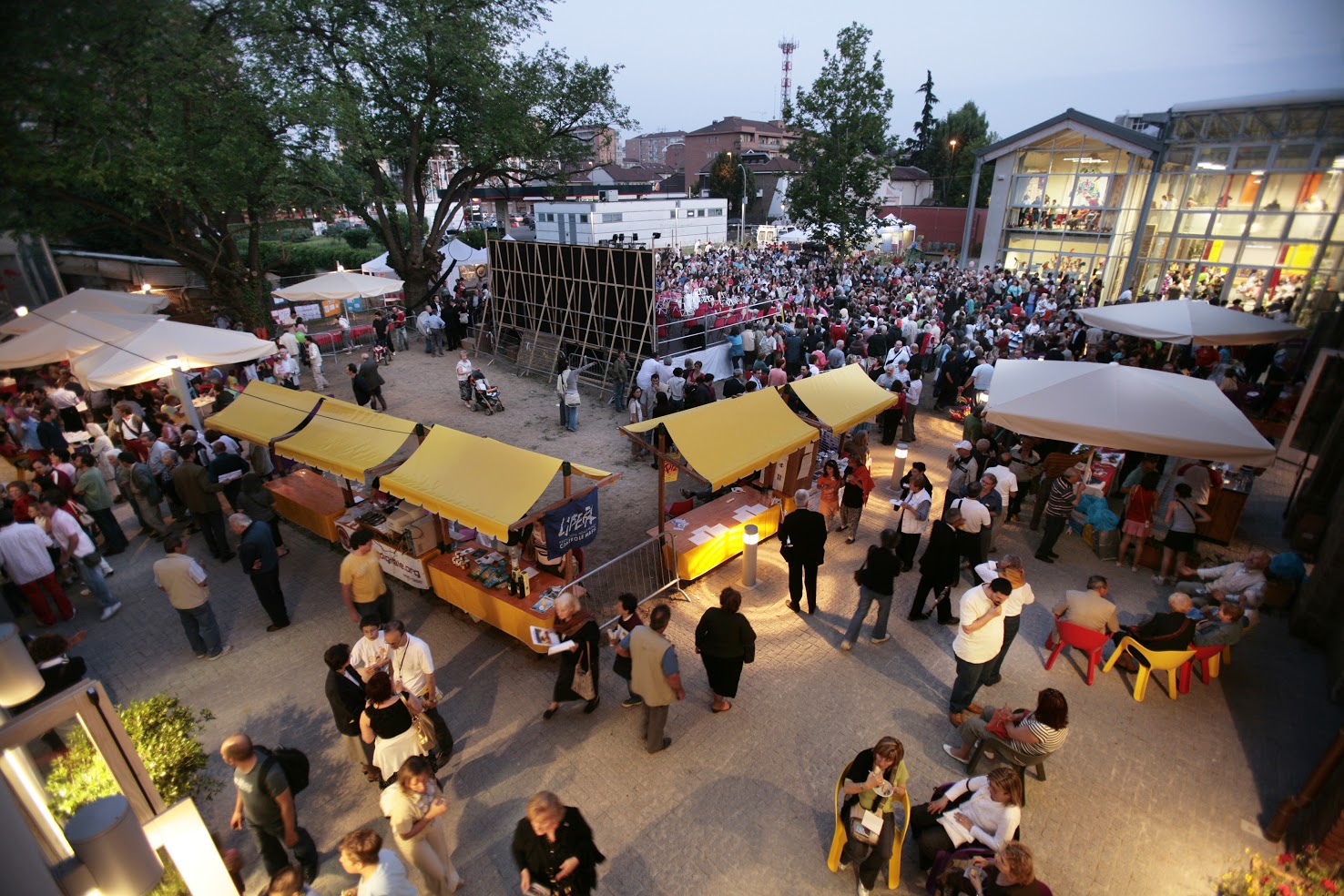 Cascina Roccafranca is a public social and cultural centre operating in a 2500m2 building and a 2000m2 courtyard at the periphery of Turin. The space hosts various services, facilities, a museum, events, more than 100 courses and the possibility to realise projects around specific subjects like ethical consumption and fair trade, inner and physical wellness, families and arts as well as counciling for legal issues around housing or trade. The “Cascina Foundation” is a unique model of a foundation established to manage a municipal building. Due to the reduction in public investment over culture, Cascina Roccafranca Foundation developeded a model where the public resources are used for new social and cultural investments, whilst the operating costs are covered by the positive turnover of economic activities, like the restaurant.
Cascina Roccafranca is a public social and cultural centre operating in a 2500m2 building and a 2000m2 courtyard at the periphery of Turin. The space hosts various services, facilities, a museum, events, more than 100 courses and the possibility to realise projects around specific subjects like ethical consumption and fair trade, inner and physical wellness, families and arts as well as counciling for legal issues around housing or trade. The “Cascina Foundation” is a unique model of a foundation established to manage a municipal building. Due to the reduction in public investment over culture, Cascina Roccafranca Foundation developeded a model where the public resources are used for new social and cultural investments, whilst the operating costs are covered by the positive turnover of economic activities, like the restaurant.
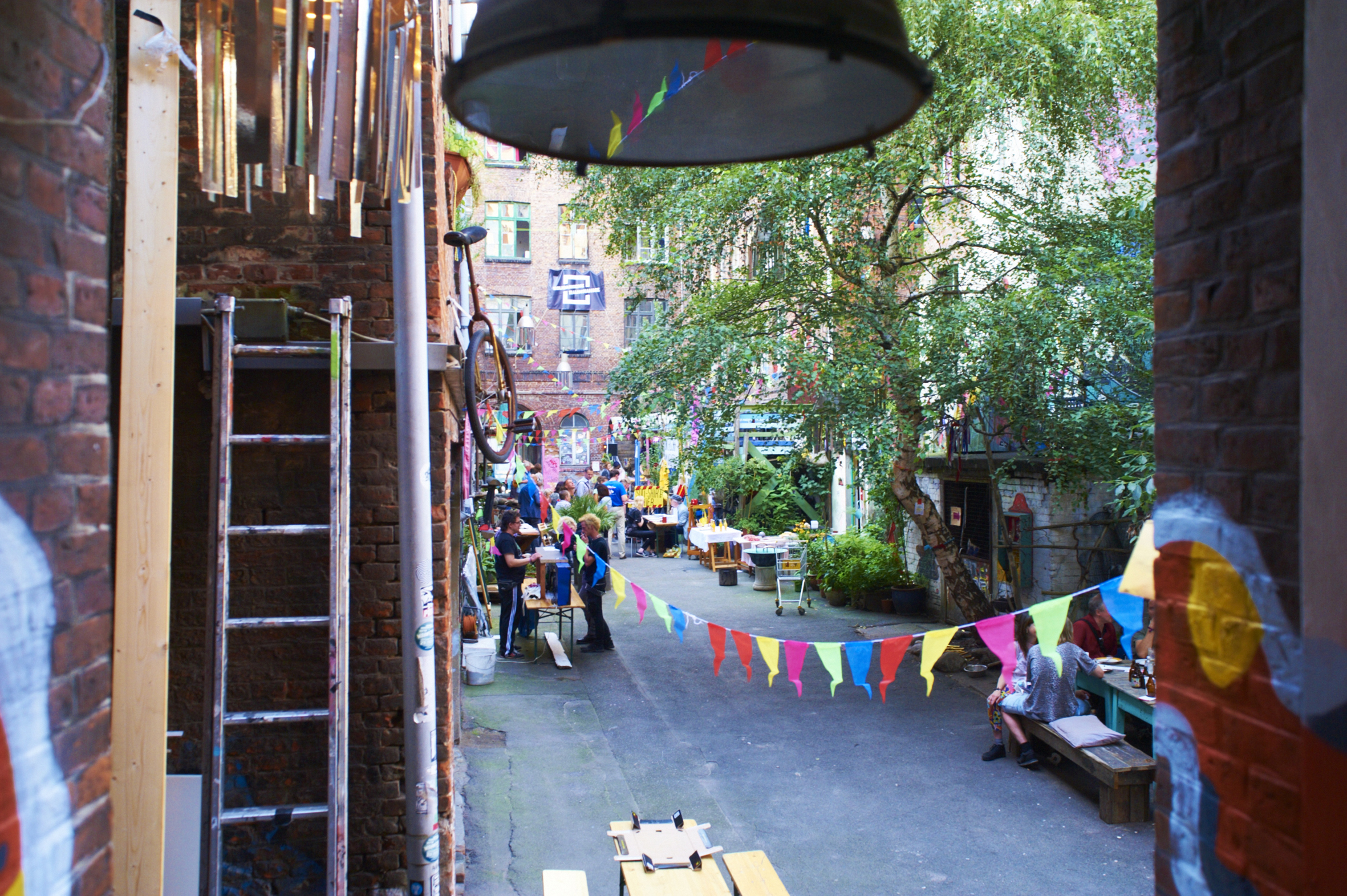 The project takes place in twelve historic buildings in Hamburg’s city centre which have been transformed into a cultural, political and social non-commercial hub for the collectivity. Starting as occupied buildings, the project has been turned into a legal process to re-activate the neighbourhood. The Gängeviertel established cooperative shares that may be purchased not only by the people who seek to use the space but also by the general public. Besides the community shares and voluntary work, the complex creates significant revenue from nightlife activities.
The project takes place in twelve historic buildings in Hamburg’s city centre which have been transformed into a cultural, political and social non-commercial hub for the collectivity. Starting as occupied buildings, the project has been turned into a legal process to re-activate the neighbourhood. The Gängeviertel established cooperative shares that may be purchased not only by the people who seek to use the space but also by the general public. Besides the community shares and voluntary work, the complex creates significant revenue from nightlife activities.
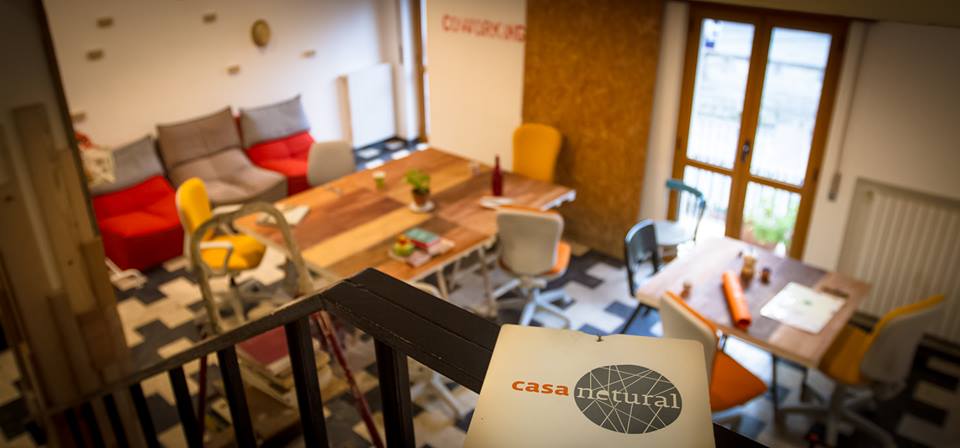 Located in a building of 220 m2 in Matera, Casa Netural includes a co-working space, a playroom, a kitchen, meeting rooms, relaxing rooms and bedrooms. The different rooms host various events and activities designed by and with the population of the neighborhood, with 90 associates and more than 500 participants. Casa Netural works as incubator for innovative and experimental projects which are enabled through a variety of economic resources coming from private funds, as well as by the income coming by the co-living fees, a percentage of the incubated projects and crowd-funding campaigns. Casa Netural’s objective is to create new business models and networks between communities and citizens around issues of social development and regional planning.
Located in a building of 220 m2 in Matera, Casa Netural includes a co-working space, a playroom, a kitchen, meeting rooms, relaxing rooms and bedrooms. The different rooms host various events and activities designed by and with the population of the neighborhood, with 90 associates and more than 500 participants. Casa Netural works as incubator for innovative and experimental projects which are enabled through a variety of economic resources coming from private funds, as well as by the income coming by the co-living fees, a percentage of the incubated projects and crowd-funding campaigns. Casa Netural’s objective is to create new business models and networks between communities and citizens around issues of social development and regional planning.
La fabrika detodalavida, Los Santos de Maimona (ES)
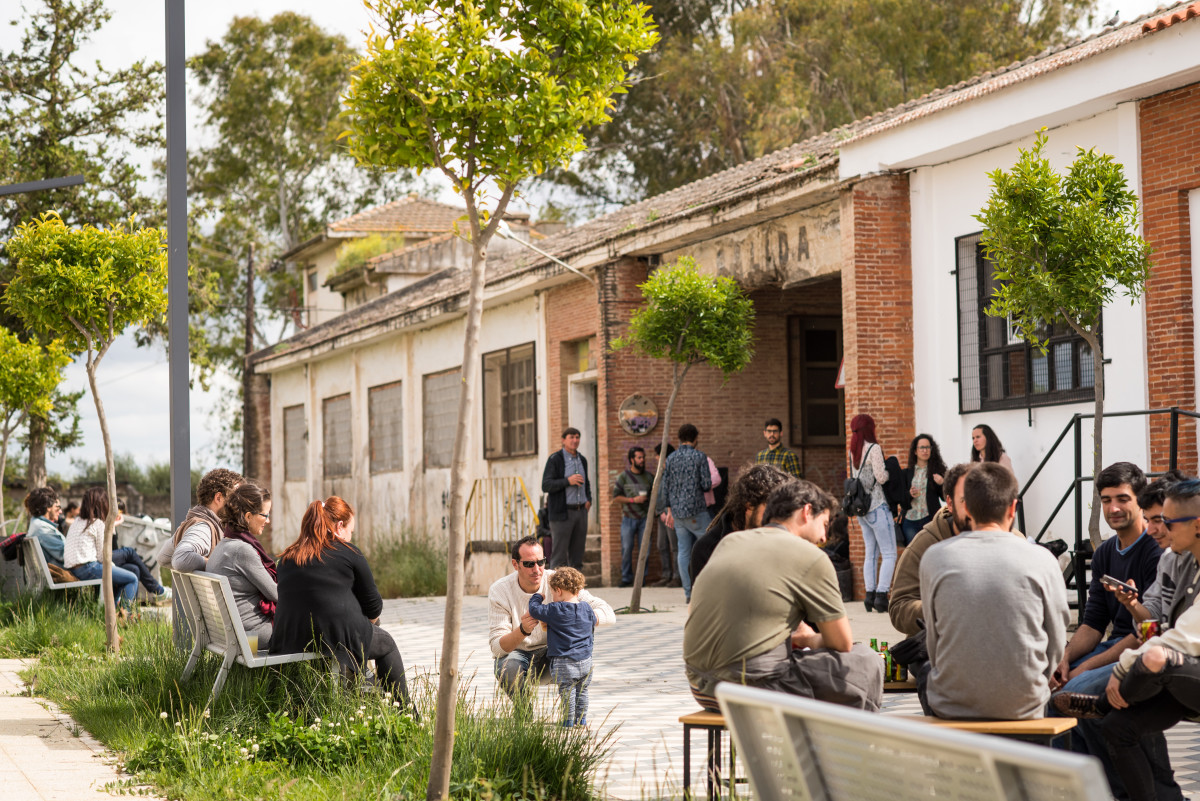 LaFábrika detodalavida is located in Los Santos de Maimona, a rural town in Extremadura. Using an old cement factory as its basis, La Fábrika detodalavida is a free, open and participatory project where anyone, any need and any idea are welcome. Initially, a crowdfunding campaign helped to collect the microfinance support which was complemented by the founders’ financial resources. Currently the project is supported by the profit of events and a system of alternative sharing system, including time banking.
LaFábrika detodalavida is located in Los Santos de Maimona, a rural town in Extremadura. Using an old cement factory as its basis, La Fábrika detodalavida is a free, open and participatory project where anyone, any need and any idea are welcome. Initially, a crowdfunding campaign helped to collect the microfinance support which was complemented by the founders’ financial resources. Currently the project is supported by the profit of events and a system of alternative sharing system, including time banking.
Nod makerspace, Bucharest (RO)
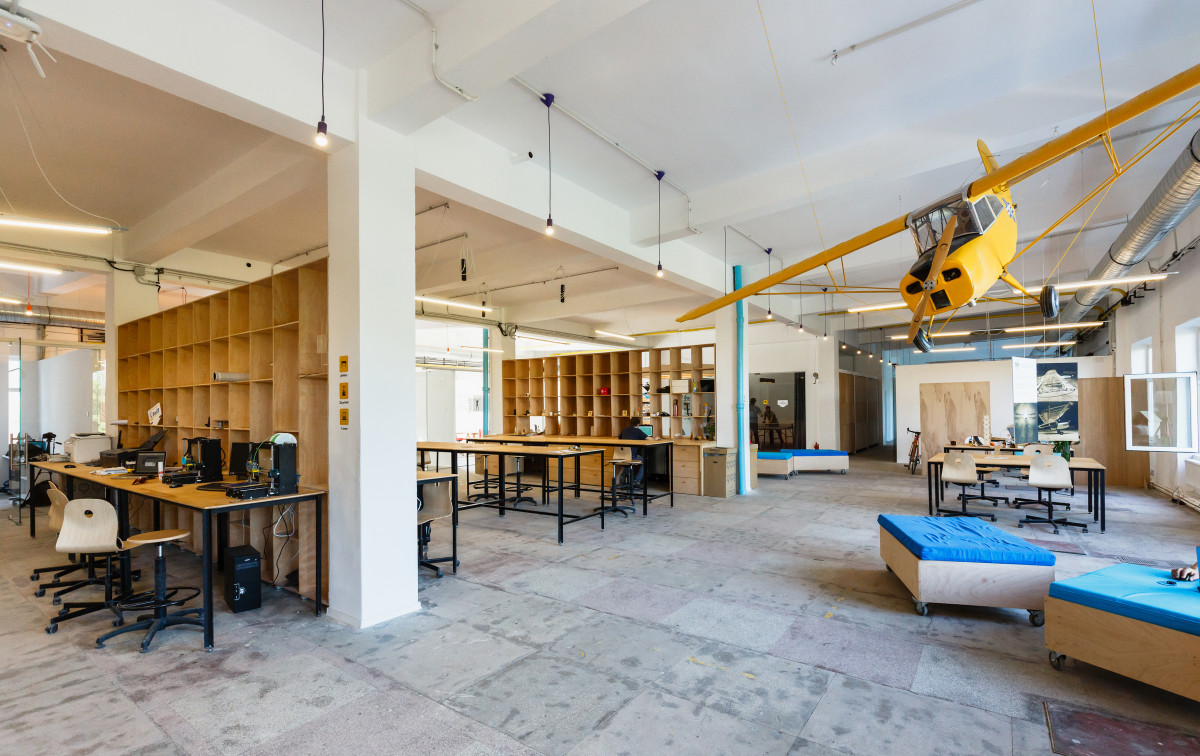 In October 2014, the initiators rented the unused and desolate 700 m2 second floor of an industrial building of the former Cotton Factory in Central Bucharest, overlooking the Dambovita river. During renovation, they presented the project to several companies in the design and construction field who agreed to support the project with construction material and equipment. The transformation of the industrial space was realised in 6 months, with a team of 15 volunteers and an investment of 120.000 euros. The sustainability of the maker space relies on membership fees and the services it provides. The space’s profit is reinvested in the development of the space, equipment and support to emerging businesses.
In October 2014, the initiators rented the unused and desolate 700 m2 second floor of an industrial building of the former Cotton Factory in Central Bucharest, overlooking the Dambovita river. During renovation, they presented the project to several companies in the design and construction field who agreed to support the project with construction material and equipment. The transformation of the industrial space was realised in 6 months, with a team of 15 volunteers and an investment of 120.000 euros. The sustainability of the maker space relies on membership fees and the services it provides. The space’s profit is reinvested in the development of the space, equipment and support to emerging businesses.
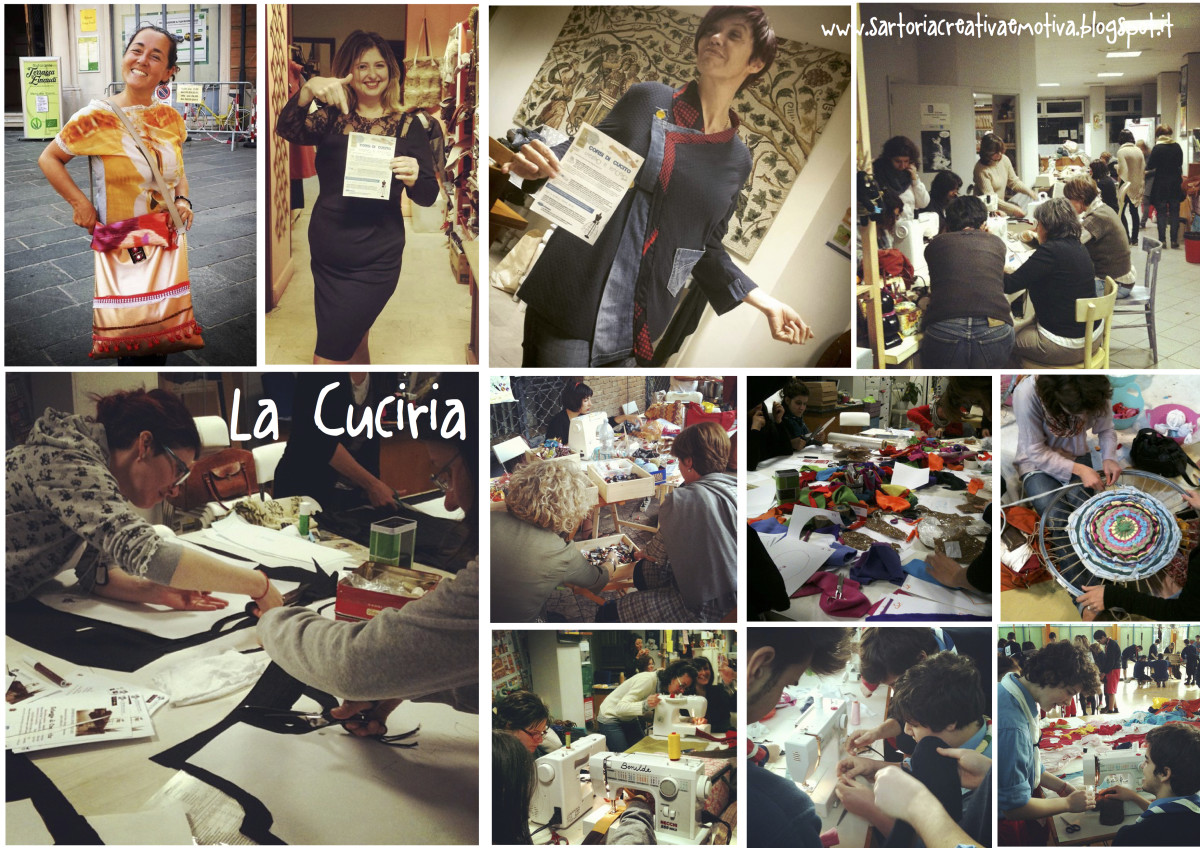 Social Sewing is based in a building of 200 m2 located in the periphery of Ravenna. The “Creative Emotive Sewing Workshop” aims at creating awareness of ethical consumption through the activity of sewing. The workshop functions as a commercial space to exhibit and sell locally created clothes to finance the operations of the space: a circular economy model where material scraps are reused to make new products that are sold to the public.
Social Sewing is based in a building of 200 m2 located in the periphery of Ravenna. The “Creative Emotive Sewing Workshop” aims at creating awareness of ethical consumption through the activity of sewing. The workshop functions as a commercial space to exhibit and sell locally created clothes to finance the operations of the space: a circular economy model where material scraps are reused to make new products that are sold to the public.
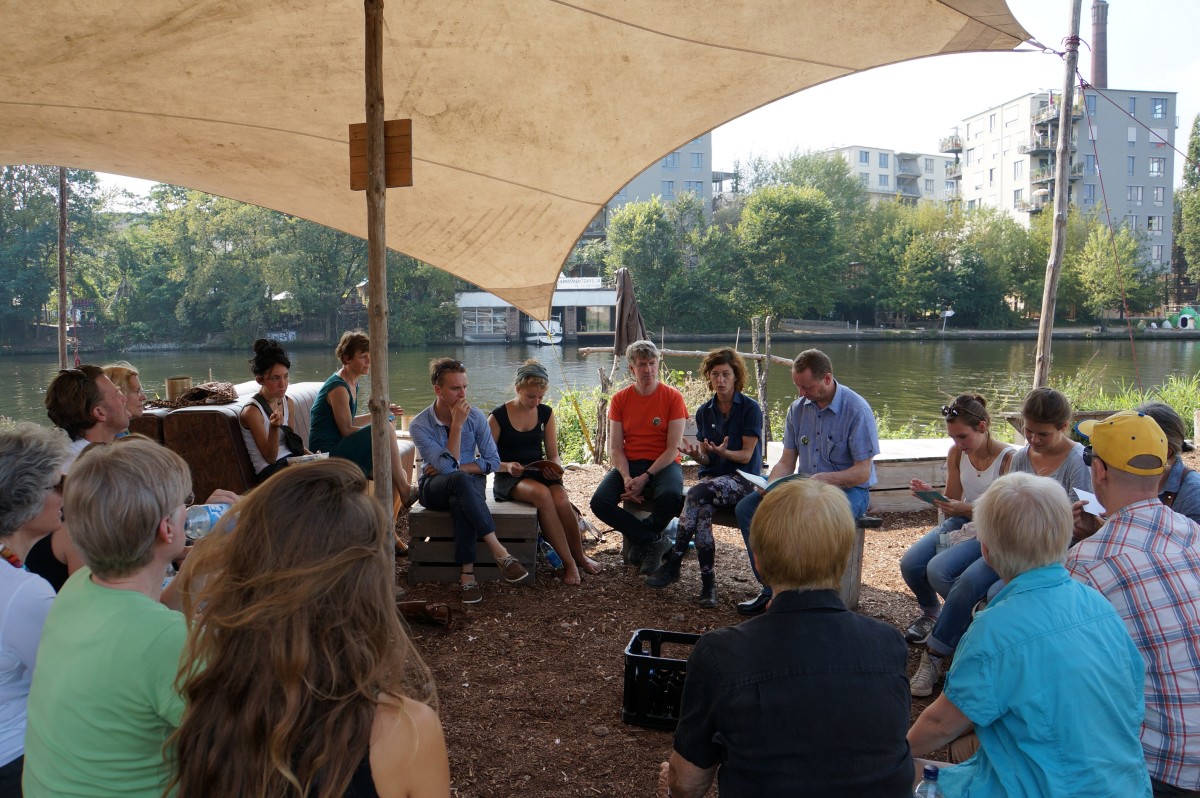 The Spreefeld was created as a pilot project to contribute to the ongoing debate around the development of the Spree river bank surrounding. The result is an area of 6.000 square meters of residential and work space with additional 1.500 square meters of mixed use with collaborative public space which is open to experimentation. Besides housing, the Spreefeld area also includes public access to the Spree through the neighbourhood, public areas at the riverbank as well as further public uses and activities. Two-thirds of the site remain unbuilt to allow for public uses. Three buildings offer spaces for living, working and creative collective activities.
The Spreefeld was created as a pilot project to contribute to the ongoing debate around the development of the Spree river bank surrounding. The result is an area of 6.000 square meters of residential and work space with additional 1.500 square meters of mixed use with collaborative public space which is open to experimentation. Besides housing, the Spreefeld area also includes public access to the Spree through the neighbourhood, public areas at the riverbank as well as further public uses and activities. Two-thirds of the site remain unbuilt to allow for public uses. Three buildings offer spaces for living, working and creative collective activities.
Peissnitzhaus,Halle/Saale (DE)
 Since the German reunification this historical building was abandoned, up until 2013 when 17 people founded the “Peißnitzhaus e.V.” ngo. The members renovated the building and revitalised it through cultural and educational events organised in collaboration other local associations. At the same time, they founded the “Peißnitzhaus Förderkreis gemeinnützige eG” – a charitable cooperative – that offers shares of 1.000€ which will help to support the renovation (by means of equity-ratio) and the takeover of ownership from the city. A charitable cooperative (under German law) is not allowed to pay interest to its shareholders, but the cooperative is allowed to give immaterial values worth up to 40 € (4%) to each member (f.e. as free entrance to cultural events). In that sense, the cooperative guarantees culture through the payment of interest rates that are culture. So far, over 90 members have signed and contributed with additional, non monetary values like know-how, materials and lobby-working.
Since the German reunification this historical building was abandoned, up until 2013 when 17 people founded the “Peißnitzhaus e.V.” ngo. The members renovated the building and revitalised it through cultural and educational events organised in collaboration other local associations. At the same time, they founded the “Peißnitzhaus Förderkreis gemeinnützige eG” – a charitable cooperative – that offers shares of 1.000€ which will help to support the renovation (by means of equity-ratio) and the takeover of ownership from the city. A charitable cooperative (under German law) is not allowed to pay interest to its shareholders, but the cooperative is allowed to give immaterial values worth up to 40 € (4%) to each member (f.e. as free entrance to cultural events). In that sense, the cooperative guarantees culture through the payment of interest rates that are culture. So far, over 90 members have signed and contributed with additional, non monetary values like know-how, materials and lobby-working.
 BAM is an experimental centre of independent cultural production in the south of Italy. This space is used to encourage the free diffusion and fruition of all kinds of knowledge, open sharing of uses, production resources and abilities, in order to be always mutualistic, cooperative and supportive. The group is made up of students, temporary employees, unemployed people, graduates, musicians, activists, artists and inhabitants of Sapri who are the greatest resource when running all the activities. To sustain BAM the community organises self-financing social dinners, crowdfunding campaigns and donations. All together they have decided to live the public places of their village, to recover them and to make them running and accessible to local inhabitants.
BAM is an experimental centre of independent cultural production in the south of Italy. This space is used to encourage the free diffusion and fruition of all kinds of knowledge, open sharing of uses, production resources and abilities, in order to be always mutualistic, cooperative and supportive. The group is made up of students, temporary employees, unemployed people, graduates, musicians, activists, artists and inhabitants of Sapri who are the greatest resource when running all the activities. To sustain BAM the community organises self-financing social dinners, crowdfunding campaigns and donations. All together they have decided to live the public places of their village, to recover them and to make them running and accessible to local inhabitants.
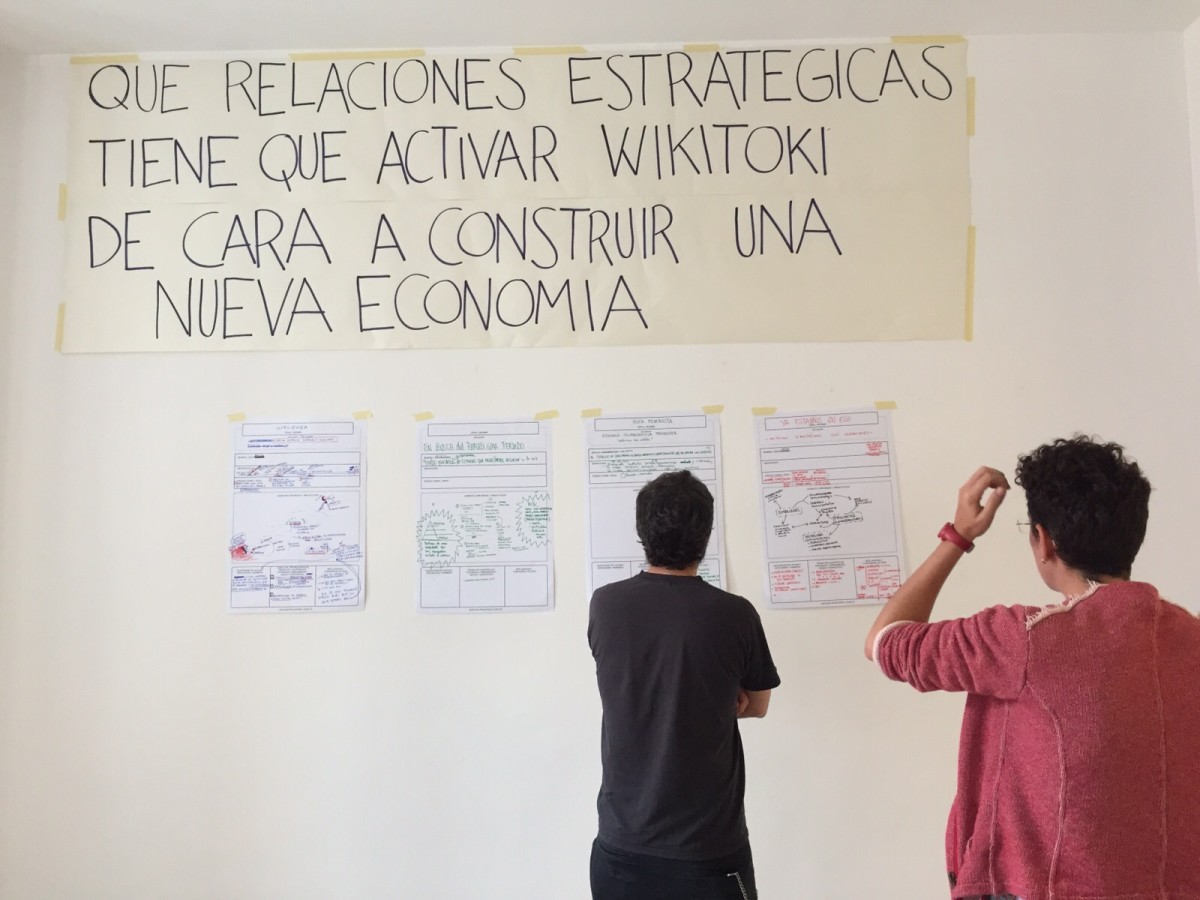 Wikitoki is a laboratory of collaborative practices located in a 370 sq mt space in Bilbao. Wikitoki hosts multiple activities with a focus on social, economic, urban, feminist, cultural and political implications that are developed through a mixture of disciplines following co-creation and active participation principles. The membership fees vary according to the different type of usage and this income is integrated with a series of activities with different economic margins that feed into a mutualistic model. Also a new system of partnership has been introduced based on the idea of residencies, to provide dynamism, open to more people and incorporate other interests and abilities.
Wikitoki is a laboratory of collaborative practices located in a 370 sq mt space in Bilbao. Wikitoki hosts multiple activities with a focus on social, economic, urban, feminist, cultural and political implications that are developed through a mixture of disciplines following co-creation and active participation principles. The membership fees vary according to the different type of usage and this income is integrated with a series of activities with different economic margins that feed into a mutualistic model. Also a new system of partnership has been introduced based on the idea of residencies, to provide dynamism, open to more people and incorporate other interests and abilities.
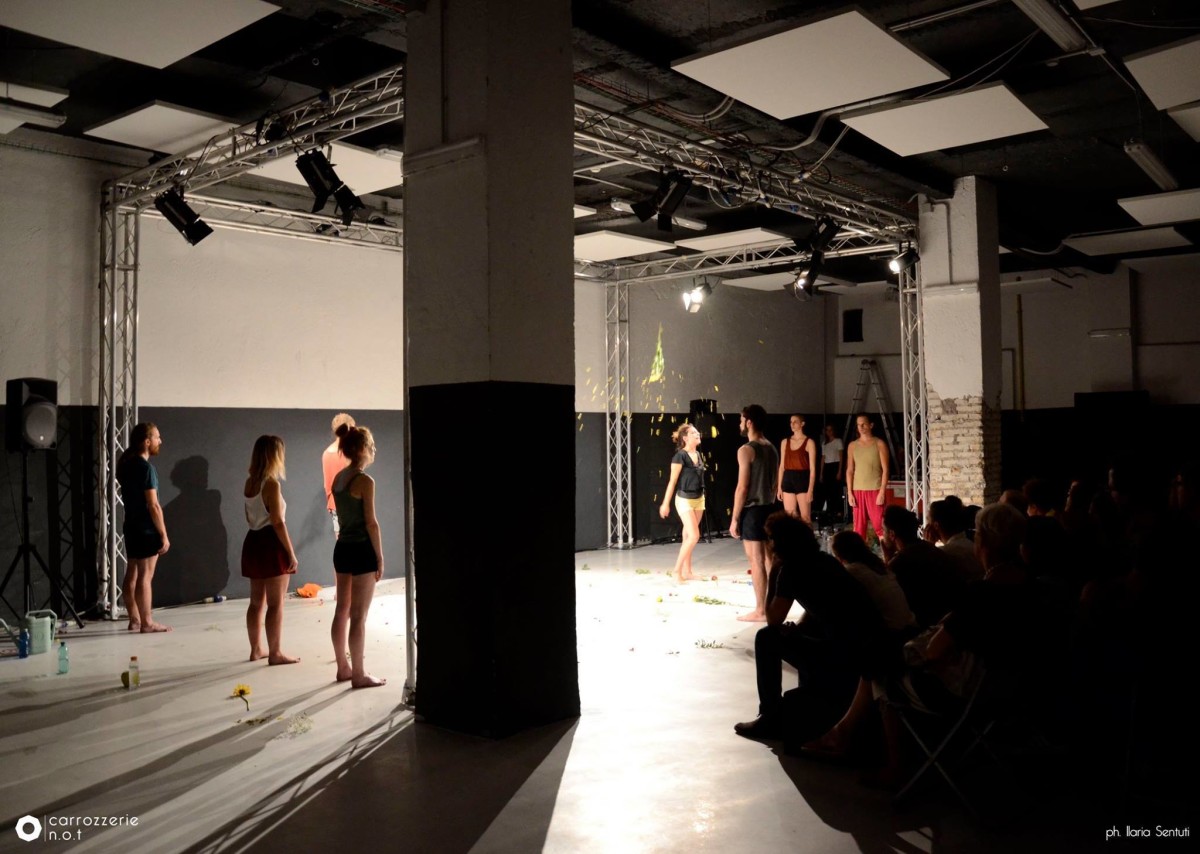 The name origins from the prior function of this 300m2 space, which used to be a car factory in Rome, and is now a cultural and performing arts centre engaged with multiple theatres, festivals and institutions in the city. This cultural association is sustained thanks to the income coming from events, performances and workshops and the profit is reinvested to run activities such as workshops and residency programs for artists. They believe that a cultural centre can be sustainable with its own professional activity and like to demonstrate it with their own actions!
The name origins from the prior function of this 300m2 space, which used to be a car factory in Rome, and is now a cultural and performing arts centre engaged with multiple theatres, festivals and institutions in the city. This cultural association is sustained thanks to the income coming from events, performances and workshops and the profit is reinvested to run activities such as workshops and residency programs for artists. They believe that a cultural centre can be sustainable with its own professional activity and like to demonstrate it with their own actions!
“Learning by doing” is the motto of this project which involves a program of collaborative learning, investigation, experimentation and prototyping. The institute DYI is hosted in a 180m2 in Madrid. The space provides the “IDYS School” with a training program conducting regularly theoretical and practical workshops, but also hosts the “Neighborhood Craft School” supporting the various neighbourhood participative initiatives developed through the Neighborhood Plan of the area. The space is organized by Todo Por la Praxis (TXP) together with some external collaborators. The space is self-managed through different financial resources such as public funding, self-funding, crowd funding and private funding, with an integration of some non-financial resources such as recycled or up-cycled materials.



